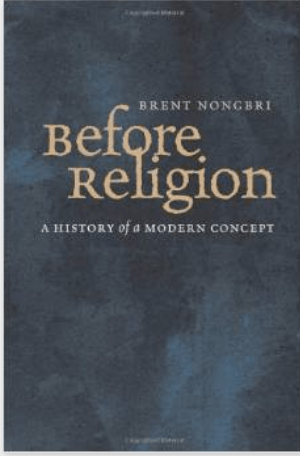For much of the past two centuries, “religion” has been understood as a universal phenomenon, a part of the “natural” human experience that is essentially the same across cultures and throughout history. Individual religions may vary through time and geographically, but there is an element, religion, that is to be found in all cultures during all time periods. Taking apart this assumption, Brent Nongbri has built upon a generation of critical scholarship to provide the first comprehensive history of “religion” as a category in western discourse.
Podcast: Play in new window | Download | Embed
Subscribe: RSS
In his recently published work, Before Religion: a History of a Modern Concept (Yale University Press, 2013), Nongbri shows that the idea of “religion” as a sphere of life distinct from politics, economics, or science is a recent development in European history—a development that has been projected outward in space and backward in time with the result that religion now appears to be a natural and necessary part of our world.
Discussing this book with Jack Tsonis, Nongbri begins by explaining various uses of the term “religio” in Roman and Christian antiquity, which were somewhat different from the modern term “religion”. The conversation then moves into the early modern period and the changes wrought by the Reformation, the rise of the political state, and the subsequent period of religious conflict. At this point we begin to see something that looks like the modern English category “religion”, although that shift was not fully consolidated until the formalization of philology and ancient world studies in the nineteenth century.
This podcast will interest all students of religion, regardless of their area of speciality. At the core of Nongbri’s project is a call for constant vigilance with the categories we use to describe human behaviour. While he does not advocate abandoning “religion”, understanding the history of the term does encourage us to use it with greater methodological reflexivity.
You can also download this interview, and subscribe to receive our weekly podcast, on iTunes. If you enjoyed it, please take a moment to rate us. And remember, you can use our Amazon.co.uk, Amazon.ca, or Amazon.com links to support us at no additional cost when you have a purchase to make.







